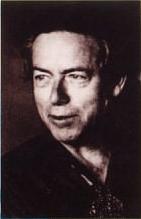 41.
Alan
Watts (1915-1973)
a professor, graduate school dean and research fellow of Harvard
University, drew heavily on the insights of Vedanta. Watts
became well known in the 1960s as a pioneer in bringing Eastern
philosophy to the West.
41.
Alan
Watts (1915-1973)
a professor, graduate school dean and research fellow of Harvard
University, drew heavily on the insights of Vedanta. Watts
became well known in the 1960s as a pioneer in bringing Eastern
philosophy to the West."There is an unrecognized but mighty taboo--our tacit conspiracy to ignore who, or what, we really are. Briefly, the thesis is that the prevalent sensation of oneself as a separate ego enclosed in a bag of skin is a hallucination which accords neither with Western science nor with the experimental philosophy religions of the East--in particular the central and germinal Vedanta philosophy of Hinduism. This hallucination underlies the misuse of technology for the violent subjugation of man's natural environment and, consequently, its eventual destruction. It is rather a cross-fertilization of Western science with an Eastern intuition".
"To the philosophers of India, however, Relativity is no new discovery, just as the concept of light years is no matter for astonishment to people used to thinking of time in millions of kalpas, (A kalpa is about 4,320,000 years). The fact that the wise men of India have not been concerned with technological applications of this knowledge arises from the circumstance that technology is but one of innumerable ways of applying it."
It is, indeed, a remarkable circumstance that when Western civilization discovers Relativity it applies it to the manufacture of atom-bombs, whereas Oriental civilization applies it to the development of new states of consciousness."
(source: Spiritual Practices of India - By Frederic Spiegelberg Introduction by Alan Watts p. 8-9).
"It was once customary to refer to these people of India and China as heathens....apart from Sufism, the Near East produced nothing to approach the high level of mystical and psychological philosophy attained in India and China."
 "Hinduism,
therefore, is perhaps the most catholic of all religions, for it
has not become so in the course of its evolution but was based
on the principle of catholicity from the beginnings. Those
who laid down the code of Manu made provision both for different
mentalities and different vocations in the most through going
manner; they showed an understanding of the social organism
which in subsequent times has seldom been equaled..."
"Hinduism,
therefore, is perhaps the most catholic of all religions, for it
has not become so in the course of its evolution but was based
on the principle of catholicity from the beginnings. Those
who laid down the code of Manu made provision both for different
mentalities and different vocations in the most through going
manner; they showed an understanding of the social organism
which in subsequent times has seldom been equaled...""It is almost certain, however, that Taoist Yoga was derived in great measure from India, and it is here that we must look for the greater wealth of information."
(source: The Legacy of Asia and Western Man - By Allan Watts p.1-2 and 28-29 and 85).
42. Friedrich Majer (1771-1818) a disciple of Johann Gottfried Herder, an Orientalist found that:
" It will no longer remain to be doubted that the priests of Egypt and the sages of Greece have drawn directly from the original well of India," that it is to 'the banks of the Ganga and the Indus that our hearts feel drawn as by some hidden urge."
And again:
"Towards the Orient, to the banks of the Ganga and the Indus, it is there our hearts feel drawn by some hidden urge - it is there that all the dark presentiments point which lie in the depths of our heart...In the Orient, the heavens poured forth into the earth."
(source: On Hinduism Reviews and Reflections - By Ram Swarup p. 102).
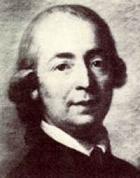 43.
Johann Gottfried Herder
(1744-1803) German philosopher, poet and
critic, clergyman, born in East Prussia. Herder was an
enormously influential literary critic and a leader in the Sturn
und Drang movement. He saw in India the:
43.
Johann Gottfried Herder
(1744-1803) German philosopher, poet and
critic, clergyman, born in East Prussia. Herder was an
enormously influential literary critic and a leader in the Sturn
und Drang movement. He saw in India the:"lost paradise of all religions and philosophies," 'the cradle of humanity,' and also its 'eternal home,' the great Orient 'waiting to be discovered within ourselves.'
According to him, "mankind's origins can be traced to India, where the human mind got the first shapes of wisdom and virtue with a simplicity, strength and sublimity which has - frankly spoken - nothing, nothing at all equivalent in our philosophical, cold European world."
Herder regarded the Hindus, because of their ethical teachings, as the most gentle and peaceful people on earth. Herder's "Thoughts of Some Brahmins "(1792) which contains a selection of gnomic stanzas in free translations, gathered from Bhartrihari, the Hitopdesa and the Bhagavad Gita, expressed these ideals.
Herder pointed out to the spiritual treasures of India in search of which later German Sansritists and Indologists had devoted their lives.
(source: Johann Gottfried Herder's Image of India (1900) - By Pranebendranath Ghosh p-334).
 Herder admired
India, as did Novalis and Heine, for its simplicity, and
denounced the Europeans for their greed, corruption, and
economic exploitation of India.
Herder admired
India, as did Novalis and Heine, for its simplicity, and
denounced the Europeans for their greed, corruption, and
economic exploitation of India.When George Forster sent him his German translation of the English version of the Sakuntala in 1791, Herder responded:
"I cannot easily find a product of human mind more pleasant than this...a real blossom of the Orient, and the first, most beautiful of its kind! ....Something like that, of course appears once every two thousand years."
He published a detailed study and analysis of Sakuntala, claiming that this work disproved the popular belief that drama was the exclusive invention of the ancient Greeks.
(source: India and World Civilization - By D. P. Singhal Part II p.229 - 231).
"O holy land (India), I salute thee, thou source of all music, thou voice of the heart' and "Behold the East - cradle of the human race, of human emotion, of all religion."
Like Sir William Jones, Herder, a Lutheran pastor, was also attracted by the Hindu ideas of pantheism and of world-soul (atman), both of which came to be viewed by the German Romantics as providing support for their own views about the transcendent wholeness and the fundamentally spiritual essence of the natural world.
(source: Oriental Enlightenment: The encounter between Asian and Western thought - By J. J. Clarke p. 61-63).
He
characterized Indian art as "a
monument of a philosophical system in the history of
mankind."
He doubted therefore
"whether any
other people on earth have treated symbolism in art as
thoroughly as Indians."
(source:
Treasures of Indian Art: Germany's
Tribute to India's Cultural Heritage - National Museum
p. foreword by Dr. Georg Lechner, Director Goethe – Institut
Muechen).
 44. Troy
Wilson Organ a professor
at Ohio University and author of The
Hindu quest for the perfection of man
and Hinduism;
its historical development,
wrote:
44. Troy
Wilson Organ a professor
at Ohio University and author of The
Hindu quest for the perfection of man
and Hinduism;
its historical development,
wrote:"Hindu thought is not a philosophy. It is a philosophical religion... "Hinduism is a sadhana which seeks to guide man to integration, to spiritualization, and to liberation......The concept of reincarnation is the Hindu way of asserting that there are no temporal nor developmental limits to the perfecting. "Hindu thought is natural, reasonable, and scientific. It is a process, not a result - a process of perfecting man". In the Hindu Monism (Advaita) God is not anthropomorphic being. He is All; He is not a despot or autocratic God.
(source: Philosophy of Hinduism - An Introduction By T. C. Galav Universal Science-Religion. Pg 123)
"In the Hindu world, the folklore and popular mythology carry the truths and teachings of the philosophers to the masses. In India, the mythology never ceased to support and facilitate the expression of philosophic thought. The rich pictorial script of the epic tradition, the features of the divinities whose incarnations and exploits constituted the myth, became the vehicles of communication for the priests. In this way a wonderful friendship of mythology and philosophy was effected; and this has been sustained with such result that the whole edifice of Indian civilization is imbued with spiritual meaning. The close interdependence of the two has served to counteract the natural tendency of the philosophy to become esoteric, removed from solving life's problems. In this symbolic form, the ideas have not been watered down to become popular. The vivid, perfectly appropriate pictorial script preserves the doctrines without the slightest damage to their senses."
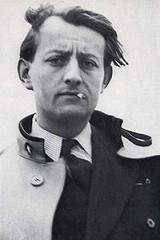 45.
Andre Malraux
(1901-1976) author of
Anti-memoir,
profound thinker and French prolific writer,
an essayist, novelist, art-historian, and political speech
writer, Malraux
did give his readers a philosophy.
45.
Andre Malraux
(1901-1976) author of
Anti-memoir,
profound thinker and French prolific writer,
an essayist, novelist, art-historian, and political speech
writer, Malraux
did give his readers a philosophy."The problem of this century is the religious problem and the discovery of Hindu thought will have a great deal to do with the solving of that particular problem".
“Europe is destructive, suicidal,” said André Malraux to Nehru in 1936, whom he would meet several times until the 1960s, trying in vain to persuade him of the relevance of India’s spirituality in today’s world.
Malraux also reflected :
"...The
West regards as truth what the Hindu regards as appearance (for if
human life, in the age of Christendom, was doubtless an ordeal it was
certainly truth and not illusion), and the Westerner can regard
knowledge of the the universe as the supreme value, while for the Hindu
the supreme value is accession to the divine Absolute.
But the most profound difference is based on the fact that the fundamental reality for the West, Christian or athiest, is death, in whatever sense it may be interpreted --- while the fundamental reality for India is the endlessness of life in the endlessness of time: Who can kill immortality?
But the most profound difference is based on the fact that the fundamental reality for the West, Christian or athiest, is death, in whatever sense it may be interpreted --- while the fundamental reality for India is the endlessness of life in the endlessness of time: Who can kill immortality?
(source:
Malraux & India -
(New Delhi : Embassy of France in India, 1996), p. 46.and Antimemires
-
By André Malraux
(Paris : Gallimard, 1967), p. 287-288). http://www.france.diplomatie.fr/culture/france/biblio/folio/malraux/
46.
Dr. Karan Singh (1931
- ) heir apparent to the Maharaja of Jammu & Kashmir, Indian
Ambassador to the U.S. and an outstanding thinker and leader. He
is a philosopher, environmentalist, statesman, orator, author
and politician.He is the author of Essays on Hinduism (1990) and he has remarked:
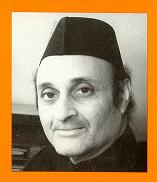 "The
Entire Cosmos is all pervaded by the same divine power. there is
no ultimate duality in human existence or in consciousness. This
is a truth which in the West is only recently being under stood
after Einstein and Heisenberg and quantum mechanics. The
Newtonian-Cartesian-Marxist paradigm of a materialistic universe
has now been finally abolished, it has collapsed in the face of
the new physics. Our ancient seers had a deeper insights into
the nature of reality than people had even until very
recently".
"The
Entire Cosmos is all pervaded by the same divine power. there is
no ultimate duality in human existence or in consciousness. This
is a truth which in the West is only recently being under stood
after Einstein and Heisenberg and quantum mechanics. The
Newtonian-Cartesian-Marxist paradigm of a materialistic universe
has now been finally abolished, it has collapsed in the face of
the new physics. Our ancient seers had a deeper insights into
the nature of reality than people had even until very
recently". (source: Essays on Hinduism - By Karan Singh p. 69-71).
He also written that:
"The master principles upon which Hinduism is based are to be found essentially in the Upanishads, which represent the high watermark not only of Indian but of world philosophy. It is in these luminous dialogues that the great issues confronting humanity have been addressed in a manner that seems to grow in relevance as we move into the global society. "
"The first and most basic concept is that of the all-pervasive Brahman — “Isavasyam idam sarvam yat kincha jagatyam jagat” (Whatever exists and wherever it exists is permeated by the same divine power.) While many philosophies have postulated unbridgeable dichotomies between god and the world, matter and spirit, the Upanishadic view is that all that exists is a manifestation without the light of consciousness behind it, and this, in a way, is the realization of the new science.
The second concept is that this Brahman resides within each individual consciousness, in the Atman. The Atman is the reflection of this all-pervasive Brahman in individual consciousness; but it is not ultimately separate from the Brahman. The concept of “Isvarah sarvabhutanam hriddese tishthati” (The lord resides within the heart of each individual) is the second great insight of the Upanishads, and the relationship between the Atman and the Brahman is the pivot upon which the whole Vedantic teaching revolves.
Another important Vedantic concept is that all human beings, because of their shared spirituality, are members of a single family. The Upanishads have an extraordinary phrase for the human race, ‘Amritasya putrah’ (Children of immortality), because we carry within our consciousness the light and the power of the Brahman regardless of race, colour, creed, sex, caste or nationality. That is the basis of the concept of human beings as an extended family — ‘Vasudhaiva kutumbakam’ — which is engraved on the first gate into our Parliament House.
"It is certainly true that Hinduism has provided the broad cultural and religious framework that has held India together despite its astonishing linguistic, ethnic and political diversity and divisions. Hinduism is as essential for an understanding of Indian culture and civilization"
(source: Keep the light shining - By Karan Singh - Hindustantimes.com).
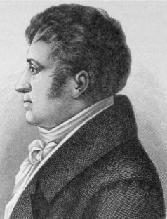 47. August Wilhelm von
Schlegel (1767-1845).German
Scholar and Poet who also learnt Sanskrit. The impulse to
Indological studies was first given in Germany, through his
book, ' The Language and Wisdom
of the Indians' which
appeared in 1818. He wrote The Bhagavat-geeta, or,
Dialogues of Krishna and Arjoon : in eighteen lectures.
47. August Wilhelm von
Schlegel (1767-1845).German
Scholar and Poet who also learnt Sanskrit. The impulse to
Indological studies was first given in Germany, through his
book, ' The Language and Wisdom
of the Indians' which
appeared in 1818. He wrote The Bhagavat-geeta, or,
Dialogues of Krishna and Arjoon : in eighteen lectures."The divine origin of man, as taught in Vedanta, is continually inculcated, to stimulate his efforts to return, to animate him in the struggle, and incite him to consider a reunion and re-incorporation with Divinity as the one primary object of every action and reaction. Even the loftiest philosophy of the Europeans, the idealism of reason as it is set forth by the Greek philosophers, appears in comparison with the abundant light and vigor of Oriental idealism like a feeble Promethean spark in the full fold of heavenly glory of the noonday sun, faltering and feeble and ever ready to be extinguished."
Schlegel edited to original text of the Bhagavad Gita, together with a Latin translation, and paid tribute to its authors:
"I shall always adore the imprints of their feet"
He noted in his book, Wisdom of the Ancient Indians, " It cannot be denied that the early Indians possessed a knowledge of the God. All their writings are replete with sentiments and expressions, noble, clear, severely grand, as deeply conceived in any human language in which men have spoken of their God..."
(source: Proof of Vedic Culture's Global Existence - By Stephen Knapp p. vii).
Hindu philosophy in comparison with which, in the words of Schlegel, "even the loftiest philosophy of the Europeans" appears "like a feeble Promethean spark in the full flood of heavenly glory of the noonday sun faltering and feeble and ever ready to be extinguished. The Divine origin of man is continually inculcated to stimulate his efforts to return, to animate him in the struggle and incite him to consider a re-union and re-corporation with Divinity as the one primary object of every action and exertion."
(source: A History of Hindu Civilization During British Rule - By Pramatha Nath Bose volume I p. x and Is India Civilized? - Essays on Indian Culture - By Sir John Woodroffe Ganesh & Co. Publishers 1922 p. 132 - 133).
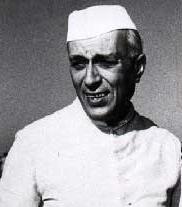 48. Jawaharlal
Nehru (1889-1964) first
prime minister of free India, was more than a deeply moral human
being. He yearned for spiritual light. He was particularly drawn
to Swami Vivekananda and the Sri Ramakrishna Ashram. The
Upanishads fascinated him. Nehru
called the Vedas as:
48. Jawaharlal
Nehru (1889-1964) first
prime minister of free India, was more than a deeply moral human
being. He yearned for spiritual light. He was particularly drawn
to Swami Vivekananda and the Sri Ramakrishna Ashram. The
Upanishads fascinated him. Nehru
called the Vedas as:"The unfolding of the human mind in the earliest stages of thought. And what a wonderful mind it was!." It is the first outpourings of the human mind, the glow of poetry, the rapture at nature's loveliness and mystery." A brooding spirit crept in gradually till the author of the Vedas cried out: 'O Faith, endow us with belief'. It raised deeper question in a hymn called the ' The Song of Creation'.
"The Bhagavad-Gita deals essentially with the spiritual foundation of human existence. It is a call of action to meet the obligations and duties of life; yet keeping in view the spiritual nature and grander purpose of the universe."
"I am proud of this noble heritage which was and still is ours, and I am aware that I too, like all of us, am a link in that uninterrupted chain which finds its origin in the dawn of history, in India's immemorial past. It is in testimony of this and as a last homage to the cultural heritage of India that I request that a handful of my ashes be thrown in the Ganga at Allahabad (formerly known as Prayag) so that they may be borne to the vast ocean that bears on the shores of India."
(source: The India I Love - By Marie-Simone Renou p.128).
Jawaharlal Nehru in his book
- A Discovery of India wrote:
" The statue of Nataraja (dance pose of
Lord Shiva) is a well known example for the artistic, scientific and
philosophical significance of Hinduism."(source: A Discovery of India - By Jawaharlal Nehru p. 214).
 49. A. E.
George Russell (1867 - 1935) the Irish
poet, essayist, painter, Nationalist leader, mystic, and
economist; a leader in movement for cooperation among Irish
farmers; editor The Irish Statesman 1923-30.
49. A. E.
George Russell (1867 - 1935) the Irish
poet, essayist, painter, Nationalist leader, mystic, and
economist; a leader in movement for cooperation among Irish
farmers; editor The Irish Statesman 1923-30.Russel paid an eloquent tribute to the Upanishads and the Bhagavad Gita.
'Goethe, Wordsworth, Emerson, and Thoreau among moderns have something of this vitality and wisdom but we can find all they have said and much more in the grand sacred books of India."
"The Bhagavad Gita and the Upanishads contain such godlike fullness of wisdom on all things that I feel the authors must have looked with calm remembrance back through a thousand passionate lives, full of feverish strife for and with shadows, ere they could have written with such certainty of things which the soul feels to be sure."
(source: A Discovery of India - By Jawaharlal Nehru p. 93).
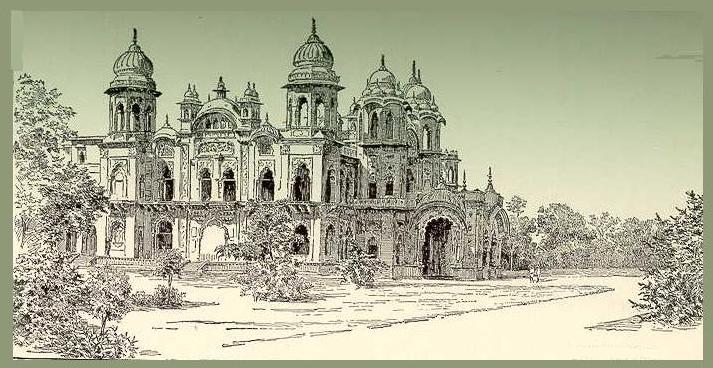
Baroda
Palace in Gujarat, India.
***
50. Paul Deussen (1845-1919) a direct disciple of Arthur Schopenhauer, preferred to be called in Sanskrit, Deva-Sena was a scholar of the Asiatic Society of Bengal, has observed:
"Whatever may be the discoveries of the scientific mind, none can dispute the eternal truths propounded by the Upanishads. Though they may appear as riddles, the key to solving them lies in our heart and if one were to approach them with an open mind one could secure the treasure as did the Rishis of ancient times"
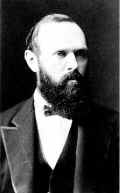 About Vedanta, he said : It is now, as in the ancient times, living in
the mind and heart of every thoughtful Hindu."
About Vedanta, he said : It is now, as in the ancient times, living in
the mind and heart of every thoughtful Hindu." (source: Indian Antiquary (1902) - By Paul Deussen and reprinted in Outline of Indian Philosophy - 1907).
He writes in his Philosophy of the Upanishads,
"God, the sole author of all good in us, is not, as in the Old Testament, a Being contrasted with and distinct form us, but rather.....our divine self. This and much more we may learn the lesson if we are willing to put the finishing touch to the Christian consciousness, and make it on all sides consistent and complete."
(source: India And Her People - By Swami Abhedananda p.234).
The Vedanta gives profoundly based reasons for all charity and brotherliness.
Dr. Deussen says, "the fact is nevertheless that the highest and purest morality is the immediate consequence of the Vedanta. The Gospels fix quite correctly as the highest law of morality 'love your neighbor as yourself'. But why should I do so, since by the order of nature I feel pain and pleasure only in myself and not in my neighbor?' " The answer is not," he says, "in the Bible but it is in the Veda in the great formula:
'That thou art' (Tat tvam asi) which gives in three words, metaphysics and morals together.
(source: Is India Civilized - Essays on Indian Culture - By Sir John Woodroffe p. 264).
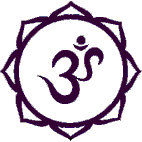 In
his Philosophy of the Upanishads,
recently translated by Rev. A. S. Geden, Prof. Deussen claims,
for its fundamental thought "an
inestimable value for the whole race of mankind."
It is in "marvelous agreement with the philosophy founded
by Kant, and adopted and perfected by his great successor
Schopenhauer." differing from it, where it does differ,
only to excel.
In
his Philosophy of the Upanishads,
recently translated by Rev. A. S. Geden, Prof. Deussen claims,
for its fundamental thought "an
inestimable value for the whole race of mankind."
It is in "marvelous agreement with the philosophy founded
by Kant, and adopted and perfected by his great successor
Schopenhauer." differing from it, where it does differ,
only to excel. "It was here that for the first time the original thinkers of the Upanishads , to their immortal honour, found it when they recognized our Atman, our innermost individual being as the Brahman, the inmost being of universal nature and of all her phenomenon." (p. 39-40)
(source: Hindu Superiority - By Har Bilas Sarda p. 298-299).
" the Upanishads have tackled every fundamental problem of life. They have given us an intimate account of reality."
"On the tree of wisdom there is no fairer flower than the Upanishads, and no finer fruit than the Vedanta philosophy,' and he added,
'The system of Vedanta, as founded on the Upanishads and Vedanta Sutras and accompanied by Shankara's commentary on them---equal in rank to Plato and Kant---is one of the most valuable products of the genius of mankind in his researches of the eternal truth.'
(source: Paul Deussen's address before the Bombay Branch of the Royal Asiatic Society on February 25, 1893).
Regarding the Cosmological hymn in the Rig Veda, he wrote:
" In its noble simplicity, in the loftiness of its philosophic vision it is possibly the most admirable bit of philosophy of olden times. .. .. .. No translation can ever do justice to the beauty of the original."
(source: History of Philosophy - By Paul Deussen vol. I p. 119 & 126).
 51.
F. C. Frederick
Crossfield Happold (1893
- ) author of several books including Mysticism: a study
and an anthology and Religious faith and twentieth-century
man, said
about the Upanishads:
51.
F. C. Frederick
Crossfield Happold (1893
- ) author of several books including Mysticism: a study
and an anthology and Religious faith and twentieth-century
man, said
about the Upanishads:"The most profound and revolutionary statement on the nature of reality, which mankind has as yet made"
(source: The Upanishads Translated for the Modern Reader By Eknath Easwaran. Nilgiri Press. 1987 quoted on book cover).
52. John Elignton ( ? ) author of A Memoir of A E Russell, wrote:
"The Bhagavad Gita and the Upanishads contain such godlike fullness of wisdom on all things that I feel the authors 'Goethe, Wordsworth, Emerson and Thoreau among moderns have something of this vitality and wisdom, but we can find all they have said and much more in the grand sacred books of the East. The Bhagavad Gita and Upanishads contain such godlike fullness of wisdom on all things that I feel the authors must have looked with calm remembrance back through a thousand passionate lives, full of feverish strife for and with shadows, ere they could have written with such certainly of things which the soul feels to he sure.'
(source: A Memoir of A E Russell - By John Eglinton 1937 p. 20).
53. Ashby Philips of Princeton University echoes:
"The Hindu argument that all religions are equally valid may well sweep the world in the next 25 years. It may well be that within the foreseeable future, it will be Hinduism which will be challenging Christianity not only in India but in the west as well. Hinduism indeed has a new vitality not only suitable for defense but also adaptable for offense against Western religions."
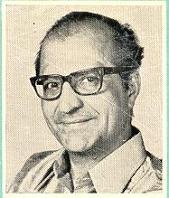 54.
Nani Ardeshir Palkhiwala
(1920-2002) a brilliant legal brain and a philanthropist. Former
prime minister Morarji Desai had described him as 'India's
finest intellectual'. A vocal proponent of press freedom,
Palkhivala was one of the directors of Press Trust of India (PTI)
representing public interest since 1985. None other than C
Rajagopalachari had once observed, ''Nani is God's gift to
India''. India's best known constitutional lawyer, author, former Indian
ambassador to the US, has said:
54.
Nani Ardeshir Palkhiwala
(1920-2002) a brilliant legal brain and a philanthropist. Former
prime minister Morarji Desai had described him as 'India's
finest intellectual'. A vocal proponent of press freedom,
Palkhivala was one of the directors of Press Trust of India (PTI)
representing public interest since 1985. None other than C
Rajagopalachari had once observed, ''Nani is God's gift to
India''. India's best known constitutional lawyer, author, former Indian
ambassador to the US, has said:"India is eternal. Though the beginnings of her numerous civilizations go so far back in time that they are lost in the twilight of history, she has the gift of perpetual youth. Her culture is ageless and is as relevant to this present 20th century as it was to the 20th century before Christ."
"Our culture is primarily concerned with spiritual development is of special significance in our age which is marked by the obsolescence of the materialistic civilization."
Ahimsa, peace and non-aggression were the hallmarks of Indian culture. In her crowded history of over 5,000 years during which she had thrown up vast and puissant empires, India never practiced military aggression on countries outside her borders. Thanks to our ethos, even today the Indian people patiently suffer miseries and endure injustices which would result in devastating explosions in any other country. In these days of spiritual illiteracy and poverty of the spirit, when people find that wealth can only multiply itself and attain nothing, when people have to deceive their souls with counterfeit after having killed the poetry of life, it is necessary to remind ourselves that civilization is an act of the spirit.
Material progress is not to be mistaken for inner progress. When technology outstrips moral development, the prospect is not that of a millennium but of extinction. Our ancient heritage is a potent antidote to the current tendency to standardize souls and seek salvation in herds.
"It has been my long-standing conviction that India is like a donkey carrying a sack of gold - the donkey does not know what it is carrying but is content to go along with the load on its back. The load of gold is the fantastic treasure - in arts, literature, culture, and some sciences like Ayurvedic medicine - which we have inherited from the days of the splendor that was India."
" Indian culture encouraged the cultivation of the intellect, not as a commodity for sale in the market-place, but for the inner joy experienced by the questing mind."
(source: India's Priceless Heritage - By Nani A. Palkhivala 1980 p.1 - 39).
"Modern India will find her identity and the modern Indian will regain his soul when our people begin to have some understanding of our priceless heritage. A nation which has had a great past can look forward with confidence to a great future. It would be restorative to national self-confidence to know that many discoveries of today are really re-discoveries and represent knowledge which ancient India had at her command. World thinkers have stood in marvel at the sublimity of our scriptures."
(source: Let's regain our lost soul - By Nani A Palkhivala - Tapovan Prasad - Chinmaya Mission vol. 39 #2 February 2001p 29).
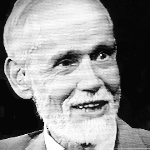 55.
Huston Smith
(1919 - ) born in China to Methodist missionaries, a philosopher, most
eloquent writer, world-famous religion scholar who practices
Hatha Yoga. Has taught at MIT and is currently
visiting professor at Univ. of California at Berkley. Smith has
also produced PBS series. He has written various books, The
World's Religions, "Science and Human
Responsibility", and "The Religions of Man".
55.
Huston Smith
(1919 - ) born in China to Methodist missionaries, a philosopher, most
eloquent writer, world-famous religion scholar who practices
Hatha Yoga. Has taught at MIT and is currently
visiting professor at Univ. of California at Berkley. Smith has
also produced PBS series. He has written various books, The
World's Religions, "Science and Human
Responsibility", and "The Religions of Man".He found in Vedantic Hinduism what he described as: "a profundity of worldview that made my Christianity look like third grade."
(source: Philadelphia Inquirer Section: Faith - By David O'Reilly Sunday June 18, 2000).
He was "perfectly content" with Christianity until the Vedanta came into his life some five decades ago. "When I read the Upanishads, I found a profundity of world view that made my Christianity seem like third grade."
(source: Rediff.com - 'Religions are like human beings).
"Men
and women that are lining the Bathing Ghats are all Hindus, but
how different they are. But India looked past their bodies into
their minds where she found the prolific
ness of the infinite exploding like a Roman cantle.
No
other civilization saw, appreciated, and classified so precisely
the full spectrum of human personality types…an achievement
that has earned for India – the title of the world’s
introspective psychologist. The
key to this psychological perceptiveness is her recognition to
the extent to which people will differ and the degree to which
these differences are to be respected.
The stages of
life - The kind of person and way we approach God – affective
– loving him, reflective person – by knowing him, active
person – by serving him, contemplative – by meditating. All
four of these way to yoga – union reach the same summit –
which you follow depends on your spiritual temperament. Side of
the mountain – which you start climbing. Hinduism’s
cosmology was prodigious in scope and depth, but India did not
stop there. She went on to advance what was probably the most
daring hypothesis man has ever conceived. We are ourselves are
the infinite, the very infinite from which the Universe
proceeds. Everything in Hinduism works to drive the point home.
(source: The
Mystic's Journey - India
and the Infinite: The Soul of a People – By Huston Smith).Here are Smith's views on Symbols and Idols of Hinduism:
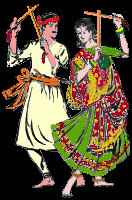 "Enter Hinduism’s myths, her
magnificent symbols, her several hundred images of God, her
rituals that keep turning night and day like never-ending prayer
wheels. It is obtuse to confuse Hinduism’s images with
idolatry, and their multiplicity with polytheism. They are
'runways' from which the sense-laden human spirit can rise for
its "flight of the alone to the Alone". Even village
priest will frequently open their temple ceremonies with the
following beloved invocation:
"Enter Hinduism’s myths, her
magnificent symbols, her several hundred images of God, her
rituals that keep turning night and day like never-ending prayer
wheels. It is obtuse to confuse Hinduism’s images with
idolatry, and their multiplicity with polytheism. They are
'runways' from which the sense-laden human spirit can rise for
its "flight of the alone to the Alone". Even village
priest will frequently open their temple ceremonies with the
following beloved invocation:O Lord, forgive three sins that are due to my human limitations:
Thou art everywhere, but I worship you here;
Thou art without form, but I worship you in these forms;
Thou needest no praise, yet I offer you these prayers and salutations,
Lord, forgive three sins that are due to my human limitations.
(source: The World's Religions - By Huston Smith p. 34).
“The invisible excludes nothing, the invisible that
excludes nothing is the infinite – the soul of India is the
infinite.”
“Philosophers tell us that the Indians were the first ones
to conceive of a true infinite from which nothing is excluded.
The West shied away from this notion. The West likes form,
boundaries that distinguish and demarcate. The trouble is that
boundaries also imprison – they restrict and confine.”
“India saw this clearly and turned
her face to that which has no boundary or whatever.” “India
anchored her soul in the infinite seeing the things of the world
as masks of the infinite assumes – there can be no end to
these masks, of course. If they express a true infinity.” And
It is here that India’s mind boggling variety links up to her
infinite soul.”
“India includes so much because her soul being infinite
excludes nothing.” It goes without saying that the universe
that India saw emerging from the infinite was stupendous.”
While the West was still thinking,
perhaps, of 6,000 years old universe – India was already
envisioning ages and eons and galaxies as numerous as the sands
of the River Ganga. The Universe so vast that modern astronomy slips
into its folds without a ripple.”
(source: The
Mystic's Journey - India
and the Infinite: The Soul of a People – By Huston Smith).
56.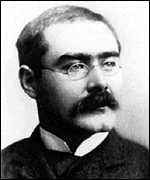 Rudyard
Kipling (1865-1936) imperial poet of British
India, as well as a writer, who spent his earliest years
blissfully happy in an India full of exotic sights and sounds. Kipling
was a Nobel Laureate in Literature, and was famous for
his poem, The
White Man's Burden.
He said this to Fundamental Christian Missionaries :
Rudyard
Kipling (1865-1936) imperial poet of British
India, as well as a writer, who spent his earliest years
blissfully happy in an India full of exotic sights and sounds. Kipling
was a Nobel Laureate in Literature, and was famous for
his poem, The
White Man's Burden.
He said this to Fundamental Christian Missionaries :
56.
 Rudyard
Kipling (1865-1936) imperial poet of British
India, as well as a writer, who spent his earliest years
blissfully happy in an India full of exotic sights and sounds. Kipling
was a Nobel Laureate in Literature, and was famous for
his poem, The
White Man's Burden.
He said this to Fundamental Christian Missionaries :
Rudyard
Kipling (1865-1936) imperial poet of British
India, as well as a writer, who spent his earliest years
blissfully happy in an India full of exotic sights and sounds. Kipling
was a Nobel Laureate in Literature, and was famous for
his poem, The
White Man's Burden.
He said this to Fundamental Christian Missionaries :

"Now it is not
good for the Christian's health to hustle the Hindu brown for
the Christian riles and the Hindu smiles and weareth the
Christian down ; and the end of the fight is a tombstone while
with the name of the late deceased and the epitaph drear ,
" A fool lies here who tried to hustle the east".
57. William Macintosh wrote: "All history points to India as the mother of science and art,"
"This country was anciently so renowned for knowledge and wisdom that the philosophers of Greece did not disdain to travel thither for their improvement."
(source: The
Invasion That Never Was - By Michel Danino and Sujata Nahar
p. 18). 57. William Macintosh wrote: "All history points to India as the mother of science and art,"
"This country was anciently so renowned for knowledge and wisdom that the philosophers of Greece did not disdain to travel thither for their improvement."
 58. Albert
Einstein, (1879-1955)
physicist. In 1905 He published his theory of Relativity.
Einstein
said:
58. Albert
Einstein, (1879-1955)
physicist. In 1905 He published his theory of Relativity.
Einstein
said:" When I read the Bhagavad-Gita and reflect about how God created this universe everything else seems so superfluous."
"We owe a lot to Indians who taught us how to count, without which no worthwhile scientific discovery could have been made."
(source: http://www.agbioworld.org/biotech_info/articles/prakash/prakashart/plant_biotech.html).
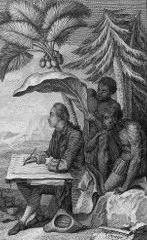 59. Pierre
Sonnerat (1748 - 1814) a French
naturalist, and author of Voyage
aux Indes Orientales et a la Chine,
concurred about ancient India, when he wrote:
59. Pierre
Sonnerat (1748 - 1814) a French
naturalist, and author of Voyage
aux Indes Orientales et a la Chine,
concurred about ancient India, when he wrote:"We find among the Indians the vestiges of the most remote antiquity....We know that all peoples came there to draw the elements of their knowledge ... India, in her splendor, gave religions and laws to all the other peoples; Egypt and Greece owed to her both their fables and their wisdom."
(source: The Invasion That Never Was - By Michel Danino and Sujata Nahar p. 18).
"Ancient India gave to to the world its religions and philosophies: Egypt and Greece owe India their wisdom and it is known that Pythagoras went to India to study under Brahmins, who were the most enlightened of human beings."
(source: Arise O' India - By Francois Gautier Har Anand publisher ISBN: 81-241-0518-9 p.25).

Pierre
Sonnerat's engravings of Gods of India from his book - Journey
to the Indies Eastern and China.
"Egypt
and Greece owe India their wisdom and it is known that
Pythagoras went to India to study under Brahmins, who were the
most enlightened of human beings."
(image
source: http://www.heatons-of-tisbury.co.uk/sonnerat.htm).
***
60.
Sir William Jones
(1746-1794),came to India as a judge of
the Supreme Court at Calcutta. He pioneered Sanskrit studies.
His admiration for Indian thought and culture was almost
limitless. Even at a time when Hinduism was at a low ebb and it
was quite fashionable to run it down, he held it in great
esteem. While he believed in Christianity, he was attracted to
the Hindu concepts of the non-duality of God, as interpreted by
Sankara, and the transmigration of the human soul. The later
theory he found more rational than the Christian doctrine of
punishment and eternity of pain. Writing to his close friend,
Earl Spencer, in 1787, he said:***
" I am no Hindu, but I hold the doctrine of the Hindus concerning a future state to be incomparably more rational, more pious, and more likely to deter men from vice, than the horrid opinions, inculcated on punishments without end"
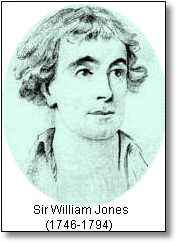 He
writes of the Hindus that they are "a
people with a fertile and inventive genius" who in some
early age...were splendid in arts and arms, happy in government;
wise in legislation, and eminent in various knowledge..."
He
writes of the Hindus that they are "a
people with a fertile and inventive genius" who in some
early age...were splendid in arts and arms, happy in government;
wise in legislation, and eminent in various knowledge..." " I am in love with the gopis, he wrote to Wilkins in 1784, 'charmed with Krishna, an enthusiastic admirer of Rama and a devout adorer of Brahma. Yudhisthir, Arjuna, Bhima and other warriors of the Mahabharata appear greater in my eyes than Agamemnon, Ajax, and Achilles appeared when I first read the Iliad.'
(source: India Discovered By John Keay p-28).
In 1794, he published a translation of the Ordinances of Manu. He said about Manu:
"A spirit of sublime devotion, of benevolence to mankind, and of amiable tenderness to all sentient creatures pervades the whole work: the style of it has a certain austere majesty, that sounds like the language of legislation and extorts a respectful awe; the sentiments of independence on all beings but God, and the harsh admonition even to kings are truly noble: and the many panagyrics on the Gayatri, the mother, as it is called, of the Veda, prove the author to have adored not the visible material sun, but the divine and incomparably greater light, to use the words of the most venerable text in the Indian Scripture, which illumines all, delights all, from which all proceed, to which all must return, and which alone can irradiate not our visual organs merely but our souls and our intellects."
(source: Eminent Orientalists: Indian European American - Asian Educational Services. p.6).
 "To
read the Vedanta, or the many fine compositions in illustration
of it, without believing that Pythagoras and Plato derived their
sublime theories from the same fountain with the sages of
India." He also gave arguments to show that a group
of Egyptian priests had settled down in India and borrowed much
from it."
"To
read the Vedanta, or the many fine compositions in illustration
of it, without believing that Pythagoras and Plato derived their
sublime theories from the same fountain with the sages of
India." He also gave arguments to show that a group
of Egyptian priests had settled down in India and borrowed much
from it."(source: The Hindu Phenomenon - By Girilal Jain p- 35-36).
Equally interesting are his poems. A Hymn to Narayana, in which he describes the Hindu theory of creation. A Hymn to Lakshmi and A Hymn to Ganga are equally fine.
A Hymn to Ganga
"How sweetly Ganga smiles, and glides,
Luxuriant o'er her broad autumnal bed!
Her waves perpetual verdure spread;
Whilst health and plenty deck her golden sides."
(source: Eminent Orientalists: Indian European American - Asian Educational Services. p.13-18).
"The analogies between Greek and Pythagorean philosophy and the Sankhya school are very obvious."
 Jones
firm belief in the
Vedas is challenging and at the same time illuminating:
Jones
firm belief in the
Vedas is challenging and at the same time illuminating:" I can venture to affirm, without meaning to pluck a leaf from the never-fading laurels of our immortal Newton, that the whole of his theology, and part of his philosophy, may be found in the Vedas".
"The six philosophical schools, whose principles are explained in the Darsana Sastra, comprise all the metaphysics of the old Academy, the Stoa, the Lyceum; nor is it possible to read the Vedanta, or the many fine compositions in illustration of it, without believing that Pythagoras and Plato derived their sublime theories from the same fountain with the Sages of India."
"We are told by the Greek writers that the Indians were the wisest of nations, and in moral wisdom, they were certainly eminent."
(source: Eminent Orientalists: Indian European American - Asian Educational Services. p.11).
Of Sankara's commentary upon the Vedanta, Sir Jones says that "it is not possible to speak with too much applause of so excellent a work."
Sir Jones says of Vedanta:
"The fundamental tenet of the Vedantic school consisted not in denying the existence of matter, that is, of solidity, impenetrability and extended figure (to deny would be lunacy), but in correcting the popular notion of it, and in contending that it has no essence independent of mental perception, that existence and perceptibility are convertible terms, that external appearances and sensations are illusory and would vanish into nothing if the divine energy, which alone sustains them were suspended but for a moment: an opinion which Epicharmus and Plato seem to have adopted, and which has been maintained in the present century with great elegance, but with little applause, partly because it has been misunderstood, and partly because it has been misapplied by the false reasoning of some popular writers, who are said to have disbelieved in the moral attributes of God, whose omnipresence, wisdom, and goodness are the basis of the Indian philosophy."
He adds: "The system is built on the purest devotion."
"Human life would not be sufficient to make oneself acquainted with any considerable part of Hindu literature."
(source: Hindu Superiority - by Har Bilas Sarda p. 203 and 296 -297).
http://www.hinduwisdom.info/quotes41_60.htm


No comments:
Post a Comment